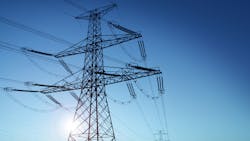MPSC Report Marks Two Years of Progress to Guide Michigan's Clean Energy Transition
The Michigan Public Service Commission has released a status report on the second year of its MI Power Grid initiative the Commission launched in 2019 in partnership with Gov. Gretchen Whitmer to help guide Michigan residents and businesses through fast-paced changes in the energy industry and better enable a transition to clean, distributed sources of electricity.
MI Power Grid (Case No. U-20645) is a multiyear effort designed to help maximize the benefits to Michiganders as electricity providers transition away from large, centrally located power plants to smaller clean, distributed energy resources including solar, battery storage and energy efficiency. MI Power Grid's three areas of emphasis are customer engagement, integrating emerging technologies, and optimizing the performance of, and investment in, the state's power grid.
To date, MPSC Staff and more than 350 stakeholders representing nearly 250 organizations — from consumer advocates, utilities, other state agencies, local governments, state lawmakers to universities, environmental groups, business customers and national laboratories - in 10 MI Power Grid workgroups have conducted 57 stakeholder meetings and issued five reports. Commissioners, meanwhile, have issued 17 orders in 10 dockets related to MI Power Grid.
"MI Power Grid is even more important as Michigan grapples with issues of reliability, affordability and impact on low-income and marginalized communities, now and into the future," said Dan Scripps, chairman, MPSC. "We are grateful to stakeholders for sticking with this effort throughout the pandemic. They understand, as we do, that a stronger, more resilient grid powered by cleaner sources of energy requires a tremendous amount of foresight and commitment to getting it right." Among the highlights of MI Power Grid's Phase II:
- The Integration of Resource/Distribution/Transmission Planning Workgroup issued its Staff report with recommendations to help shape planning efforts, focused on resilience, forecasting, transmission planning, value of generation diversity, emissions recommendations and environmental justice recommendations, and alignment of distribution/resource/transmission planning. The Commission directed Staff to create a redline version updating the Michigan Integrated Resource Planning Parameters that reflects Staff recommendations, feedback from stakeholders, and Governor Whitmer's MI Healthy Climate Plan directives by Dec. 22, 2021, and to work with stakeholders in Phase III to finalize updates to the MIRPP and IRP filing requirements in 2022.
- The Competitive Procurement Workgroup, with input from utilities and other stakeholders, issued a Competitive Procurement Report with draft guidelines; the Commission later sought formal feedback on the report. The Commission in September 2021 issued an order adopting amended guidelines and directing Staff to survey stakeholders within five years to assess whether the guidance is working and whether updates are necessary.
- The New Technologies and Business Models Workgroup has focused on creating a shared understanding of different technologies and their potential applications, including microgrids, electric vehicles, energy storage, and distributed energy generation, with the goal to identify barriers and potential solutions. The workgroup filed a draft report in September that was distributed to stakeholders for comment. The final report is to be filed by Dec. 1, 2021.
- The Distributed Energy Resources Rate Design Workgroup is exploring how customer-owned generation and energy storage are changing the way energy customers use the grid, cost allocation and possible customer charges, and proposing rate design options, with guidance from Michigan Senate Resolution 142 of 2020. The workgroup commissioned the Regulatory Assistance Project for assistance, and a draft study was presented to stakeholders in September. After stakeholder feedback is considered, a final study will be presented to the Michigan Legislature on Nov. 1, 2021.
- The Customer Education and Participation Workgroup has been convening stakeholders to examine issues around customer data access; data privacy, sharing and customer consent; opportunities and barriers to customer engagement in MPSC-related activities; and equitable outreach and access to utility programs and offerings. As customers are increasingly relied upon to be active, engaged and dependable participants in Michigan's energy transition, the workgroup is examining the ways in which the Commission can improve customer access to and participation in energy waste reduction and demand response programs, time of use rates, distributed energy and other demand-side resources. The Commission directed Staff to consider how the MPSC's response to the COVID-19 pandemic, the MPSC's 2021-2025 strategic plan; the MPSC's diversity, equity, and inclusion efforts, and the MPSC's outreach to Michigan's tribal communities can inform the workgroup's recommendations. MPSC Staff will make a draft report available for stakeholder comment and issue a final report by Feb. 25, 2022.
MI Power Grid's remaining focus areas will include financial incentives and disincentives for utility performance, distribution system data access, updating the Michigan Integrated Resource Planning Parameters and IRP filing requirements, time-based pricing, and voluntary green pricing.
